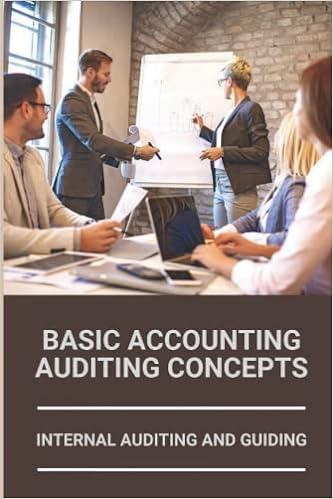Question
On January 1, Year 1, a contractor agrees to build on the customers land a bridge that is expected to be completed at the end
On January 1, Year 1, a contractor agrees to build on the customers land a bridge that is expected to be completed at the end of Year 3. The bridge is a single performance obligation to be satisfied over time. The contractor determines that the progress toward completion of the bridge is reasonably measurable using the input method based on costs incurred. The contract price is $4,000,000, and initial expected total costs of the project are $2,400,000.
| Year 1 | Year 2 | Year 3 | ||||
| | | | ||||
| Costs incurred during each year | $ 600,000 | $1,200,000 | $1,100,000 | |||
| Costs expected in the future | 1,800,000 | 1,200,000 |
^ this is the question form the professor and I did the answers for year 1-2-3 :
Year 1 By the end of Year 1, 25% [$600,000 ($600,000 + $1,800,000)] of the total expected costs have been incurred. Using the input method based on costs incurred, the contractor recognizes 25% of the total expected revenue ($4,000,000 contract price 25% ) = $1,000,000 and cost of goods sold $2,400,000. 25%) = $600,000. The difference between these amounts is the gross profit for Year 1.
Revenue $1,000,000, Cost of goods sold $600,000 , Gross profit (1,000,000 600,000) =$400,000. The gross profit in Year 1 of $400,000 also may be calculated as total expected gross profit from the project of $1,600,000 ($4,000,000 - $2,400,000) times the progress toward completion of the contract of 25%.
Year 2 By the end of Year 2, total costs incurred are $1,800,000 ($600,000+ $1,200,000). Given that $1,200,000 is expected to be incurred in the future, the total expected cost is $3,000,000 ($1,800,000 + $1,200,000). The change in the total cost of the contract must be accounted for prospectively. By the end of Year 2, 60% ($1,800,000 $3,000,000) of expected costs have been incurred. Thus, $2,400,000 ($4,000,000 60%) of cumulative revenue and $1,800,000 ($ 3,000,000 60%) of cumulative cost of goods sold should be recognized for Years 1 and 2. Because $1,000,000 of revenue and $600,000 of cost of goods sold were recognized in Year 1, revenue of $1,400,000 ($2,400,000 cumulative revenue - $1,000,000) and cost of goods sold of $1,200,000 ($1,800,000 cumulative cost of goods sold - $600,000) are recognized in Year 2. Revenue $1,400,000 Cost of goods sold 1,200,000 Gross profit -- Year 2 $200,000* * The gross profit in Year 2 of $200,000 also may be calculated as the cumulative gross profit for Years 1 and 2 of $600,000 [($4,000,000 - $3,000,000) 60%] minus the gross profit recognized in Year 1 of $400,000.
Year 3 At the end of Year 3, the project is completed, and the total costs incurred for the contract are $2,900,000 ($600,000 + $1,200,000 + $1,100,000). Given $2,400,000 of cumulative revenue and $1,800,000 of cumulative cost of goods sold for Years 1 and 2, $1,600,000 ($4,000,000 contract price - $2,400,000) of revenue and $1,100,000 ($2,900,000 total costs - $1,800,000) of cost of goods sold are recognized in Year 3. Revenue $1,600,000 Cost of goods sold 1,100,000 Gross profit -- Year 3 $500,000 NOTE: (1) The total gross profit from the project of $550,000 ($400,000 + $200,000 + $500,000) equals the contract price of $4,000,000 minus the total costs incurred of $2,900,000. (2) When progress toward completion is measured using the cost-to-cost method, as in the example above, the cost of goods sold recognized for the period equals the costs incurred during that period.
NOW : I need the answer for this question:
An entity may not be able to estimate the degree of completion of a project at the end of the first year, perhaps because this is the first time such a project has been undertaken by the firm. In that case, how much revenue would the firm recognize in that year if significant costs have been incurred in the construction process?
Step by Step Solution
There are 3 Steps involved in it
Step: 1

Get Instant Access to Expert-Tailored Solutions
See step-by-step solutions with expert insights and AI powered tools for academic success
Step: 2

Step: 3

Ace Your Homework with AI
Get the answers you need in no time with our AI-driven, step-by-step assistance
Get Started


